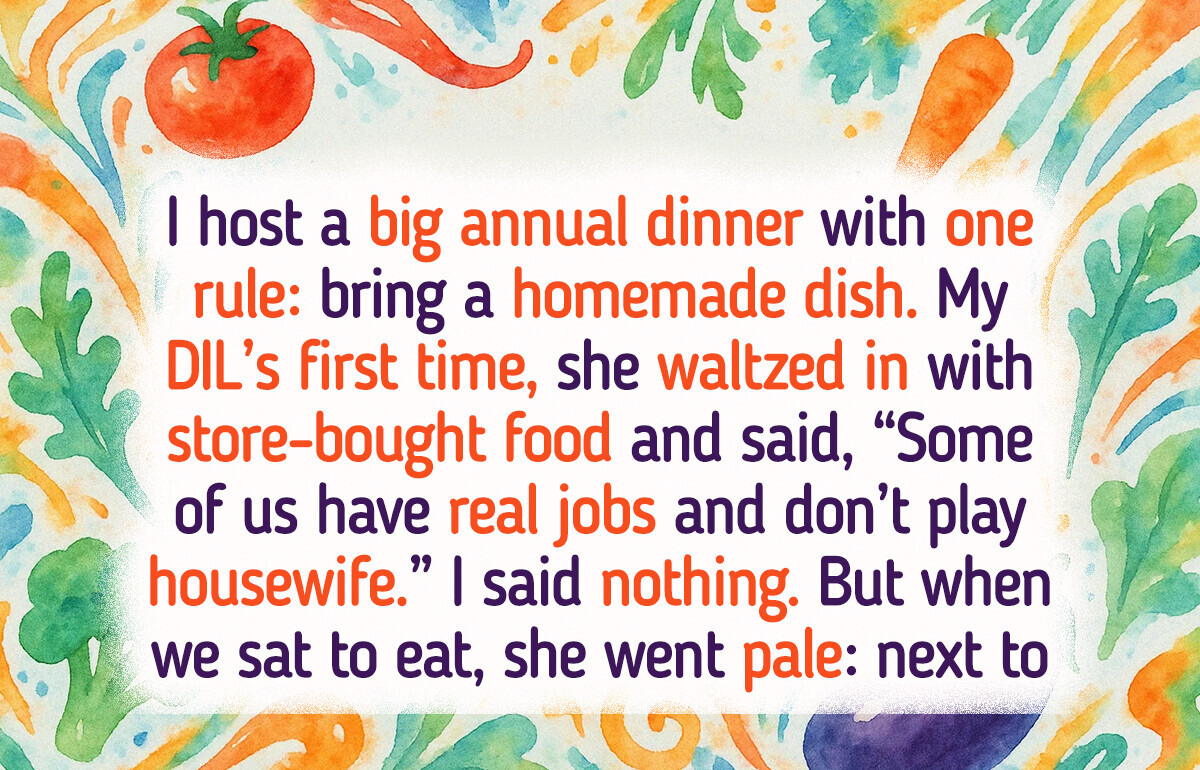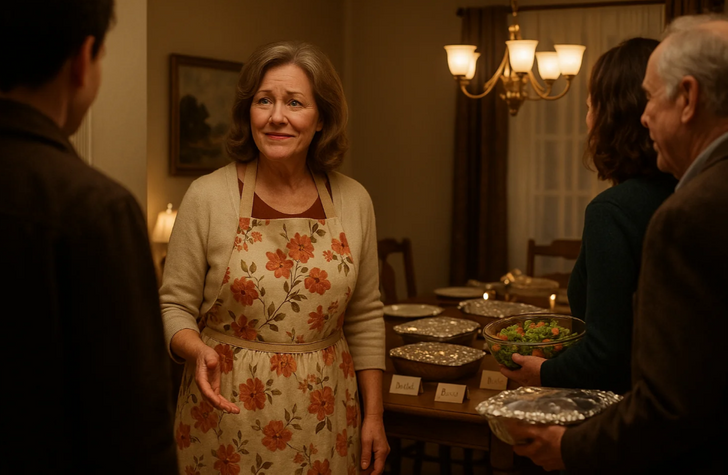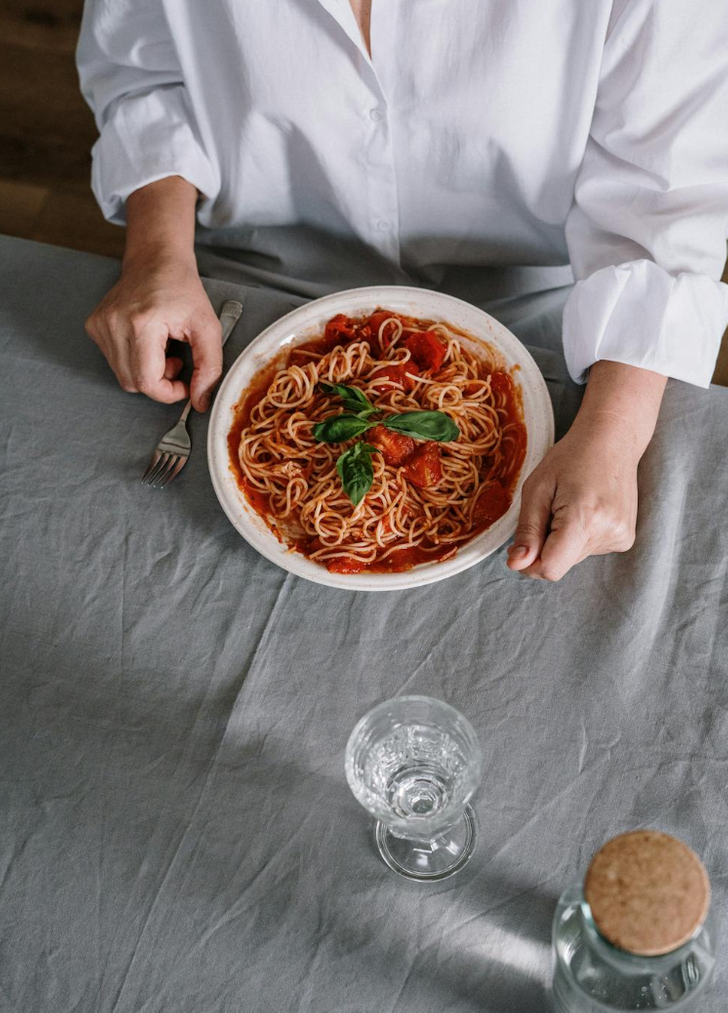Your son could have cooked something instead of his wife...
I Created a Special Label for My Daughter-in-law After She Publicly Insulted Me

Today’s letter comes from Linda, a devoted matriarch who has hosted a cherished family dinner for over 25 years with just one rule: every guest must bring a homemade dish. But when her new daughter-in-law, Melissa, arrived with store-bought pasta salad and some sharp words about “playing housewife,” tensions flared. Linda responded with a passive-aggressive label on the dish, leading to a dramatic scene that divided the family. She’s written to us asking if her response crossed a line. Here’s our take on this family food fight.
Here’s Linda’s story:

I (58F) have been hosting an annual family dinner for over 25 years. It started when my children were young and has grown to include extended family, in-laws, and even close friends who might as well be family. This dinner is my pride and joy, a tradition that everyone looks forward to. I have exactly ONE rule for this dinner: every guest must bring a homemade dish to share. It doesn’t have to be fancy, just made with their own hands.
My son John (32M) married Melissa (30F) last year. This was her first time attending my annual dinner as an official family member. I’ve always tried to welcome her into our family, but there’s been tension from the beginning. She’s a corporate lawyer and makes it known she thinks our family traditions are “quaint” and “outdated.”
When I called everyone to remind them about the dinner, I specifically mentioned the homemade dish rule to Melissa. She laughed and said, “Yes, I heard about your little requirement.” Something about her tone bothered me, but I brushed it off.
The night of the dinner arrived. Everyone was showing up with their dishes — my daughter’s famous mac and cheese, my brother’s spicy chili, my husband’s apple pie. Then Melissa and John arrived.

She waltzed in with store-bought food and said, “Some of us have real jobs and don’t play housewife. Unlike you, I don’t have the luxury of wasting time in a kitchen.”
The room went silent. My son looked mortified. I saw my sister-in-law’s jaw drop. Even my normally unflappable husband seemed stunned. Melissa stood there holding a plastic container with the grocery store label clearly visible. It was a pre-made pasta salad that cost maybe $8.99.
I felt my face burning, but 40 years of being a southern hostess has taught me to keep my composure. I smiled tightly and said, “Well, thank you for bringing something, dear. Please put it on the table with the other dishes.”
John pulled me aside later and whispered, “Mom, I’m so sorry. She’s been stressed at work and didn’t have time to make anything.”
I simply replied, “There’s always time for what matters, John.”
Dinner started, and everyone began serving themselves from the buffet table. The conversation was stilted at first, but gradually returned to normal as everyone caught up on family news.

I said nothing. But when we sat to eat, she went pale: next to her plate, I had placed a small handwritten card that read: “Melissa’s Store-Bought Pasta Salad — Because Some Things Are More Important Than Family Traditions.”
She immediately stood up, tears in her eyes. “This is absolutely petty and uncalled for! You’re trying to humiliate me in front of everyone!”
I calmly replied, “I’m simply labeling the dishes, dear. Everyone should know what they’re eating.”
“You’re impossible!” she shouted. “John, I want to leave NOW.”
My son looked torn. “Mom, was that really necessary?”
Before I could respond, my older brother jumped in. “Melissa, no one is asking you to be Martha Stewart, but this dinner has one simple rule. We all make time for it because we respect each other and the traditions that matter to this family.”
Melissa stormed out, and John followed her after giving me a disappointed look.
The dinner continued, but the mood was ruined. Later that night, I received scathing texts from John saying I had intentionally embarrassed his wife and that I was being childish and petty.
My husband thinks I went too far with the card. My daughter says Melissa deserved it for her “housewife” comment. My sister thinks I should have pulled Melissa aside privately instead of making a public statement.
Am I the bad guy for calling out my DIL’s store-bought contribution in front of everyone after she insulted me and my tradition?
Finding Balance Between Tradition and Grace
Linda, thank you for sharing your story with us. We understand how deeply you value the annual dinner you’ve lovingly hosted for over two decades. Family traditions like yours create meaningful connections across generations and deserve to be honored. Your one simple rule—bringing a homemade dish—represents more than just food; it symbolizes the time, effort, and personal touch that builds family bonds. We recognize the hurt you felt when Melissa dismissed this tradition and made that cutting “housewife” comment, which was undeniably disrespectful toward you and the work you’ve put into maintaining family connections. The dinner clearly holds emotional significance for everyone involved, as evidenced by your relatives’ dishes that they prepare year after year. Your feelings of being disrespected in your own home during a special occasion were entirely valid.
When Words Cut Deeper Than Knives
The confrontation between you and Melissa reveals layers of tension that likely go beyond just a pasta salad. Her comment about “real jobs” and “playing housewife” was unnecessarily hurtful and dismissive of your life choices and contributions to the family. Such remarks reflect a generational and perhaps cultural divide about the value of domestic work and traditional family roles. We can see how this might have felt like an attack on not just your dinner rule but on your identity and the worth of what you’ve dedicated your life to. The silence that fell over the room shows that others recognized the inappropriateness of her comment too. Your initial response—graciously accepting the store-bought dish despite your disappointment—showed admirable restraint in a difficult moment. Your son’s explanation about Melissa’s work stress may have some validity, but it doesn’t excuse speaking disrespectfully to you in your home during a meaningful family gathering.
The Passive-Aggressive Place Card Served Nobody Well
While we sympathize with your hurt feelings, the handwritten card labeling Melissa’s dish was a misstep that escalated the conflict rather than resolving it. Public shaming rarely produces positive outcomes in family dynamics. Your action turned what could have been a private teachable moment into a public humiliation that forced everyone present to witness and take sides in your conflict. This approach undermined your moral high ground and shifted focus away from Melissa’s disrespect toward your response to it. Your brother’s defense of the tradition was well-intentioned but came too late to salvage the situation, as emotions had already boiled over. The ruined evening and aftermath of angry texts from your son demonstrate that this approach damaged relationships rather than strengthening understanding of your tradition’s importance.
Building Bridges for Future Family Gatherings
Moving forward, we believe there’s an opportunity for growth on both sides of this family divide. Direct, private communication about expectations and mutual respect would serve your family better than passive-aggressive gestures or public confrontations. Consider reaching out to Melissa and John for a calm conversation about why this tradition matters to you, while also listening to understand the pressures in their lives that might make homemade cooking feel burdensome. Perhaps offering to teach Melissa a simple recipe, suggesting she and John could cook together, or even modifying your rule to be more flexible for those with demanding careers could help integrate new family members while preserving the spirit of your tradition. Remember that traditions evolve as families grow, and some adaptation might strengthen rather than weaken the bonds you’ve worked so hard to create. A sincere conversation acknowledging both the hurt you felt and the hurt you caused could begin healing this rift before next year’s dinner.
A Recipe for Reconciliation
In conclusion, Linda, while Melissa’s behavior was disrespectful, your response didn’t help resolve the underlying issues. The most valuable family tradition isn’t any particular dinner rule but the love and acceptance that brings people together despite their differences. We encourage you to take the first step toward reconciliation, focusing on the relationship you want with your son and his wife rather than winning this particular battle. A heartfelt conversation expressing your feelings without accusation, combined with a willingness to find compromise, could transform this painful episode into a turning point for your family. After 25 years of bringing family together, you have the wisdom and grace to navigate this challenge too. Your dinner tradition has succeeded for so long precisely because it creates connection—don’t let this conflict undermine the very purpose it was meant to serve.
Uncover the heartbreaking tale of a bride who endured public humiliation from her groom on their wedding day, ultimately forcing her to call off the ceremony.
Comments
Related Reads
I Was Expected to Be the Family Babysitter on Vacation, But I Had Other Plans

10+ Ways Your Body Could Alert You to Hidden Health Issues

7 Myths About Ancient Egypt Movies Tricked Us Into Believing

Baby Girl With a Rare Smile Grew Up — What She Looks Like Today Will Leave You Speechless

14 Celebrities Whose Appearance Has Evolved Over the Past Decade

14 Famous Actors of the Past Two Decades Who Changed Beyond Recognition

We Turned 16 Old Hollywood Icons Into Modern Celebrities — The Results Will Surprise You

15+ Times Celebrities Showed Up in Identical Looks — You Decide Who Won

10+ Famous People Reveal That One Thing They Deeply Regret

10+ Wardrobe Choices You Don’t Realize Are Ruining Your Look

We Modernized 18 Vintage Hollywood Icons — You Won’t Believe How Different They Look

18 People Who Truly Know What It Means to Be Unlucky




